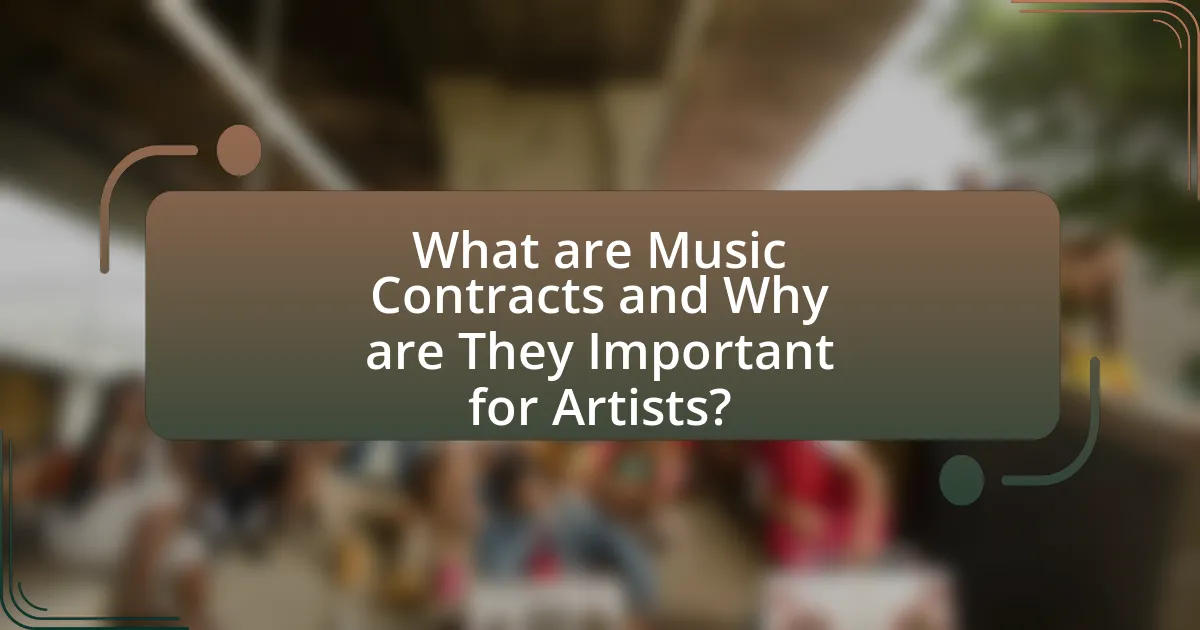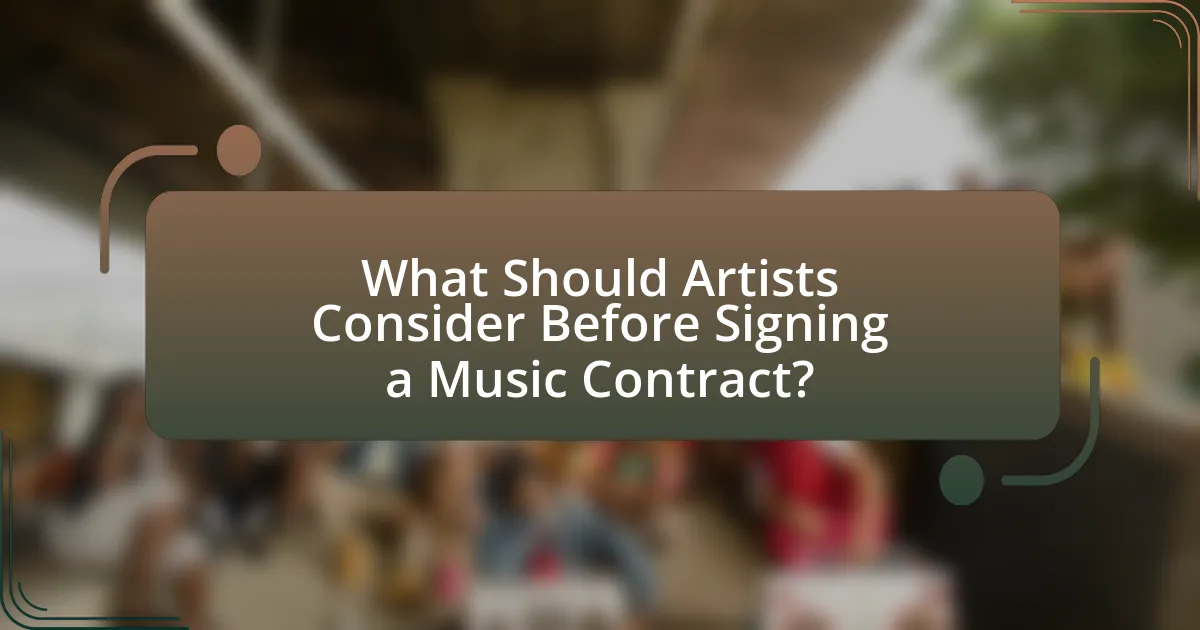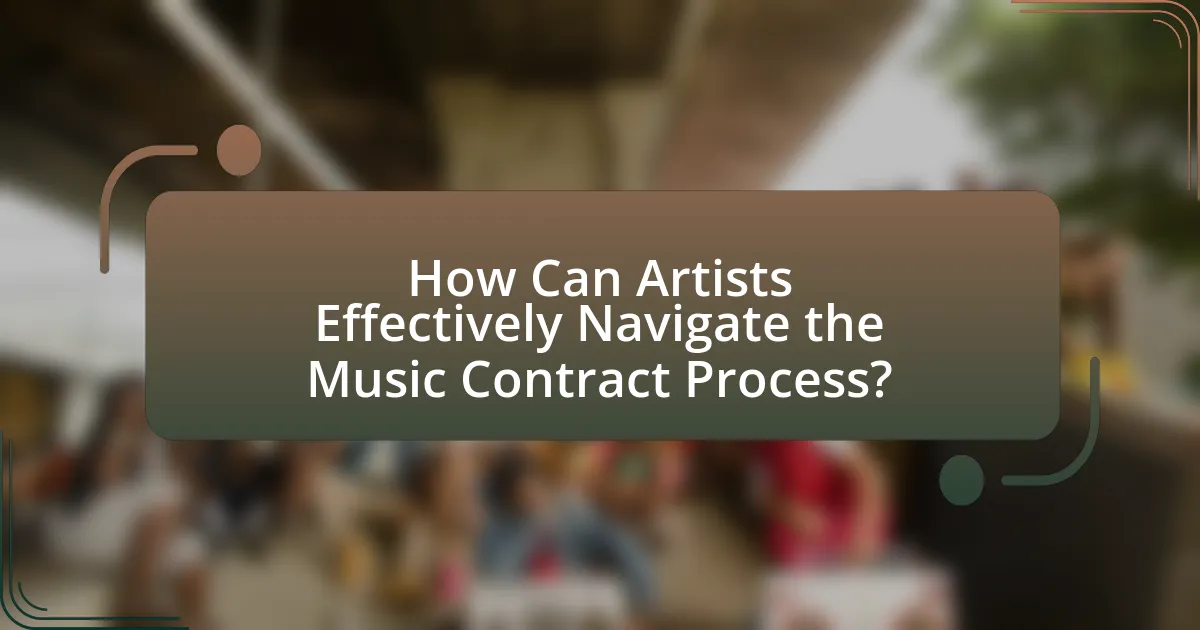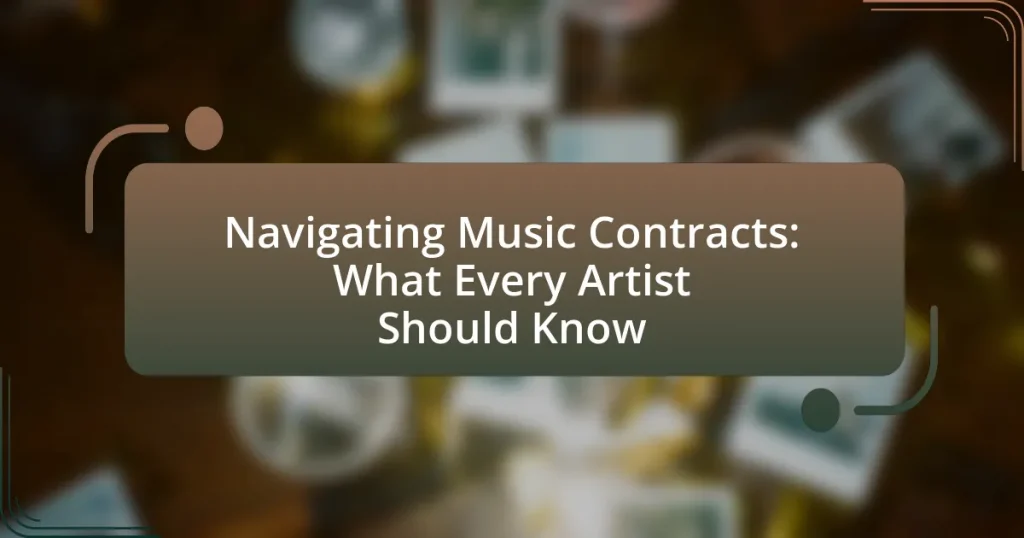Music contracts are essential legal agreements that define the terms between artists and various stakeholders in the music industry, including record labels, producers, and managers. This article provides a comprehensive overview of different types of music contracts, such as recording, publishing, and management contracts, and explains their significance in protecting artists’ rights and ensuring fair compensation. It also highlights the importance of understanding key contract terms, the potential pitfalls artists may encounter, and strategies for effective negotiation and management of contracts. By emphasizing the legal rights artists gain through contracts and the steps they should take before signing, the article serves as a crucial resource for artists navigating the complexities of the music industry.

What are Music Contracts and Why are They Important for Artists?
Music contracts are legally binding agreements that outline the terms and conditions between artists and other parties, such as record labels, producers, or managers. These contracts are crucial for artists as they define rights, responsibilities, and compensation, ensuring that artists are protected and fairly compensated for their work. For instance, a recording contract typically specifies the percentage of royalties an artist will receive, the duration of the agreement, and the obligations of both parties. Without clear contracts, artists risk losing control over their music and income, which can lead to disputes and financial instability.
What types of music contracts exist?
There are several types of music contracts that exist, including recording contracts, publishing contracts, management contracts, and licensing agreements. Recording contracts establish the terms between an artist and a record label regarding the production and distribution of music. Publishing contracts govern the rights to song compositions and how royalties are collected and distributed. Management contracts outline the relationship between an artist and their manager, detailing responsibilities and compensation. Licensing agreements allow third parties to use an artist’s music for specific purposes, such as in films or commercials, often involving a fee or royalty arrangement. Each type of contract serves a distinct purpose in the music industry, ensuring that the rights and responsibilities of all parties are clearly defined.
What is a recording contract?
A recording contract is a legal agreement between a music artist and a record label that outlines the terms of recording, distribution, and promotion of the artist’s music. This contract typically specifies the rights and obligations of both parties, including the duration of the agreement, financial arrangements such as advances and royalties, and the ownership of the recorded material. Recording contracts are essential in the music industry as they establish the framework for the artist’s career and the label’s investment in the artist’s work.
What is a publishing agreement?
A publishing agreement is a legal contract between a songwriter or composer and a music publisher that outlines the terms of how the songwriter’s music will be managed, promoted, and monetized. This agreement typically specifies the rights granted to the publisher, including the ability to license the music for various uses, collect royalties, and administer the copyright. According to the U.S. Copyright Office, a publishing agreement is essential for ensuring that songwriters receive compensation for the use of their work, as it establishes the framework for royalty distribution and rights management.
What is a management contract?
A management contract is a legal agreement between an artist and a manager that outlines the terms of representation and management services. This contract typically specifies the manager’s responsibilities, the duration of the agreement, and the commission structure, which often ranges from 10% to 20% of the artist’s earnings. Management contracts are essential in the music industry as they establish the professional relationship and expectations between the artist and the manager, ensuring that both parties are aligned on goals and compensation.
How do music contracts protect artists?
Music contracts protect artists by legally defining the terms of their relationship with record labels, producers, and other stakeholders, ensuring that artists receive fair compensation and retain control over their creative work. These contracts typically outline rights related to royalties, distribution, and ownership of intellectual property, which are crucial for an artist’s financial stability and artistic integrity. For instance, a well-structured contract can specify the percentage of royalties an artist earns from sales and streams, thereby safeguarding their income. Additionally, contracts often include clauses that protect artists from exploitation, such as limitations on the use of their music without consent. This legal framework is essential for artists to navigate the complexities of the music industry and to secure their rights effectively.
What legal rights do artists gain through contracts?
Artists gain legal rights through contracts that typically include copyright ownership, performance rights, and revenue sharing. Copyright ownership allows artists to control the reproduction and distribution of their work, ensuring they receive recognition and financial compensation for their creations. Performance rights grant artists the ability to perform their music publicly and receive royalties from such performances. Revenue sharing clauses in contracts outline how profits from sales, streaming, and licensing are divided, providing artists with a clear understanding of their financial entitlements. These rights are essential for protecting artists’ interests and ensuring they are compensated fairly for their contributions to the music industry.
How can contracts prevent disputes in the music industry?
Contracts can prevent disputes in the music industry by clearly defining the rights and responsibilities of all parties involved. By outlining specific terms such as payment structures, ownership of intellectual property, and obligations for performance, contracts minimize misunderstandings that can lead to conflicts. For instance, a well-drafted contract can specify the percentage of royalties an artist receives, thereby reducing ambiguity and potential disagreements over financial matters. Additionally, contracts often include dispute resolution clauses, which provide a structured process for addressing conflicts, further decreasing the likelihood of escalation into legal battles. This structured approach is supported by the fact that the majority of legal disputes in the music industry arise from vague or poorly defined agreements, highlighting the importance of clear contractual terms.

What Should Artists Consider Before Signing a Music Contract?
Artists should consider the terms of the music contract, including rights, royalties, and obligations, before signing. Understanding the specifics of ownership rights is crucial, as contracts often dictate who owns the music and how it can be used. Additionally, artists should evaluate the royalty structure, which determines how much they earn from sales, streaming, and licensing. Obligations such as the duration of the contract and the number of albums required can significantly impact an artist’s career trajectory. According to the Music Industry Research Association, artists who negotiate favorable terms can retain more creative control and financial benefits, highlighting the importance of thorough contract review.
What key terms should artists look for in a contract?
Artists should look for key terms such as “royalties,” “advances,” “termination clauses,” “exclusivity,” and “rights ownership” in a contract. These terms define how artists will be compensated for their work, the conditions under which the contract can be ended, whether the artist is restricted from working with others, and who retains ownership of the music. For instance, understanding the royalty structure is crucial, as it dictates the percentage of earnings the artist will receive from sales and streams. Additionally, clarity on rights ownership ensures that artists know if they retain control over their creative output or if it is transferred to the label.
What does the term “royalties” mean in a music contract?
The term “royalties” in a music contract refers to the payments made to artists, songwriters, and producers based on the revenue generated from the use of their music. These payments can arise from various sources, including sales of recordings, streaming services, public performances, and licensing agreements. Royalties are typically calculated as a percentage of the income generated, ensuring that creators receive compensation for their work. For example, in the United States, the Music Modernization Act of 2018 established clearer guidelines for how royalties are distributed, particularly in the context of digital streaming, reinforcing the importance of fair compensation in the music industry.
How do advances work in music contracts?
Advances in music contracts are upfront payments made by record labels to artists, intended to cover future earnings from album sales or royalties. These advances are recoupable, meaning the label deducts the amount paid from the artist’s future earnings until the advance is fully paid back. For example, if an artist receives a $100,000 advance and generates $150,000 in sales, the label will recoup the advance from those earnings before the artist receives any additional payments. This structure incentivizes labels to invest in artists while ensuring that artists are compensated for their work upfront.
What are common pitfalls artists face in music contracts?
Common pitfalls artists face in music contracts include unclear terms, lack of legal representation, and unfavorable royalty splits. Unclear terms can lead to misunderstandings about rights and obligations, often resulting in disputes. Many artists neglect to seek legal advice, which can result in signing contracts that are not in their best interest. Additionally, unfavorable royalty splits can significantly reduce an artist’s earnings, as industry standards often favor record labels over the artists themselves. According to a 2020 study by the Music Industry Research Association, 70% of artists reported dissatisfaction with their contract terms, highlighting the prevalence of these issues.
What should artists avoid when negotiating contracts?
Artists should avoid signing contracts without thoroughly reviewing all terms and conditions. This includes overlooking clauses related to royalties, rights, and obligations, which can significantly impact their financial and creative control. For instance, a study by the Music Industry Research Association highlights that artists who neglect to understand their contract terms often face disputes over revenue sharing and ownership rights, leading to potential legal battles and financial losses. Therefore, careful examination and possibly seeking legal advice are crucial steps for artists during contract negotiations.
How can artists identify unfavorable contract clauses?
Artists can identify unfavorable contract clauses by carefully reviewing the language and terms of the contract, focusing on clauses that limit their rights or impose excessive obligations. Key indicators of unfavorable clauses include those that grant the label or publisher broad rights to the artist’s work without adequate compensation, impose long-term commitments without exit options, or contain vague language that could lead to misinterpretation. Additionally, artists should seek legal advice from professionals experienced in entertainment law to ensure they fully understand the implications of each clause. Research indicates that artists who consult with legal experts are more likely to negotiate favorable terms, as they can identify potential pitfalls that may not be immediately apparent.

How Can Artists Effectively Navigate the Music Contract Process?
Artists can effectively navigate the music contract process by thoroughly understanding the terms and seeking professional legal advice. Familiarity with key contract elements, such as rights, royalties, and obligations, enables artists to make informed decisions. Engaging a music attorney can provide insights into industry standards and help negotiate favorable terms. According to the American Bar Association, artists who consult with legal professionals are more likely to secure beneficial agreements, reducing the risk of exploitation and misunderstandings.
What steps should artists take before signing a contract?
Artists should conduct thorough research and seek professional advice before signing a contract. This includes reviewing the contract terms, understanding rights and obligations, and consulting with a lawyer experienced in entertainment law. Additionally, artists should evaluate the reputation of the other party involved and consider the long-term implications of the contract on their career. According to the American Bar Association, artists who take these steps are more likely to protect their interests and avoid potential disputes.
How can artists conduct due diligence on potential partners?
Artists can conduct due diligence on potential partners by researching their backgrounds, reviewing past collaborations, and assessing their reputation within the industry. This process involves checking the partner’s previous work, understanding their business practices, and seeking feedback from other artists who have worked with them. For instance, artists can utilize platforms like LinkedIn to verify professional histories and look for any red flags in reviews or testimonials. Additionally, analyzing social media presence and engagement can provide insights into the partner’s public perception and reliability. This thorough investigation helps artists make informed decisions and avoid potential pitfalls in partnerships.
What role does legal counsel play in contract negotiations?
Legal counsel plays a critical role in contract negotiations by providing expert advice on legal implications and ensuring compliance with applicable laws. They analyze contract terms to protect their client’s interests, identify potential risks, and negotiate favorable conditions. For instance, legal counsel can clarify complex legal jargon, ensuring that artists understand their rights and obligations within the contract. This expertise is essential in the music industry, where contracts often involve intricate details regarding royalties, licensing, and distribution rights. By leveraging their knowledge of legal precedents and industry standards, legal counsel helps artists avoid pitfalls that could lead to financial loss or legal disputes.
What strategies can artists use to negotiate better contract terms?
Artists can negotiate better contract terms by conducting thorough research on industry standards, leveraging their unique value, and seeking professional legal advice. Researching industry norms allows artists to understand typical compensation, rights, and obligations, which strengthens their negotiating position. By highlighting their unique artistic contributions and audience engagement, artists can justify requests for more favorable terms. Additionally, consulting with a lawyer experienced in entertainment law ensures that artists fully comprehend contract language and implications, enabling them to negotiate effectively. These strategies are supported by the fact that informed artists are more likely to secure advantageous agreements, as evidenced by numerous case studies in the music industry where artists who sought legal counsel achieved better outcomes.
How can artists leverage their market value in negotiations?
Artists can leverage their market value in negotiations by clearly demonstrating their unique selling points, such as audience engagement metrics, streaming statistics, and previous sales data. By presenting concrete evidence of their popularity and demand, artists can justify higher compensation and better contract terms. For instance, a study by Nielsen Music indicates that artists with a strong social media presence and high streaming numbers can negotiate up to 30% more in royalties compared to those without such metrics. This data underscores the importance of quantifying market value to strengthen negotiation positions.
What are effective negotiation tactics for artists?
Effective negotiation tactics for artists include thorough preparation, clear communication, and leveraging industry knowledge. Artists should research market rates and comparable contracts to establish a strong baseline for negotiations. Clear communication of their needs and expectations helps to avoid misunderstandings and fosters a collaborative atmosphere. Additionally, artists can leverage their unique value, such as fan engagement or artistic vision, to negotiate better terms. According to a study by the Berklee College of Music, artists who are well-prepared and informed about industry standards achieve more favorable contract terms, demonstrating the importance of these tactics in successful negotiations.
What are best practices for managing music contracts post-signing?
Best practices for managing music contracts post-signing include maintaining organized records, regularly reviewing contract terms, and ensuring compliance with obligations. Organized records facilitate easy access to contract details, which is crucial for tracking deadlines and deliverables. Regularly reviewing contract terms helps artists stay informed about their rights and responsibilities, allowing them to address any issues proactively. Ensuring compliance with obligations, such as payment schedules and performance requirements, is essential to avoid legal disputes and maintain professional relationships. These practices are supported by industry standards that emphasize the importance of contract management in the music business.
How can artists keep track of contract obligations and deadlines?
Artists can keep track of contract obligations and deadlines by utilizing digital tools such as project management software, calendar applications, and reminder systems. These tools allow artists to set specific deadlines, receive notifications, and organize their contractual commitments efficiently. For instance, platforms like Trello or Asana enable users to create task lists and timelines, ensuring that no obligation is overlooked. Additionally, maintaining a dedicated folder for contracts, whether physical or digital, helps artists easily reference their agreements and associated deadlines. This systematic approach is supported by research indicating that organized task management significantly improves adherence to deadlines and reduces the risk of missed obligations.
What should artists do if they need to renegotiate a contract?
Artists should first review the existing contract to identify specific terms they wish to renegotiate. This review allows artists to understand their rights and obligations, which is crucial for effective negotiation. Next, artists should prepare a clear rationale for the changes they seek, supported by market research or comparable industry standards, to strengthen their position. Finally, artists should initiate a conversation with the other party, ideally in writing, to formally request a renegotiation meeting, ensuring they communicate their needs professionally and respectfully.
